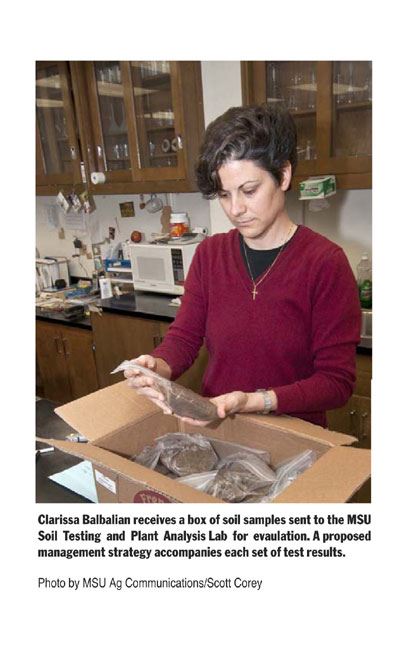Conduct Soil, Nematode Tests Before Spring Work
MISSISSIPPI STATE, MISS.
Two soil tests conducted routinely help Mississippi producers ensure the productivity of their farmland.
Soil tests in the fall to determine fertility levels and nematode tests in the spring to detect harmful pests help producers improve soil quality before spring tillage and planting begin.
Keith Crouse, Mississippi State University Extension Service agronomy specialist and coordinator of the MSU Soil Testing and Plant Analysis Lab, said fall tests give growers time to correct any problems revealed in the samples. Much of this work can be done in the fall when primary tillage is performed.
“If lime is needed to adjust soil pH, fall application allows time for the lime to react with soil so the soil pH will be adjusted before the following spring,” Crouse said.

He recommended soil tests be taken every three years. Soil tests conducted by the Extension Service determine soil pH levels, organic matter and estimated reserve sulfur, phosphorus, potassium, calcium, magnesium, sodium and zinc. Soil test reports list the nutrients tested and fertility recommendations for lime and nutrients needed for the crops to be grown.
Wayne Ebelhar, Mississippi Agricultural and Forestry Experiment Station agronomist at the Delta Research and Extension Center in Stoneville, said the value of the information received in a soil or nematode test is priceless.
“A soil test is your diagnostic tool to determine where you stand,” Ebelhar said. “If you’ve been putting out fertilizer with no soil test, and your soil test levels are extremely high, indicating you don’t need to apply any fertilizer, the soil test can save you potentially thousands and thousands of dollars in fertilizer you don’t need.”
At the other extreme, no amount of irrigation or other management inputs can boost productivity on soils that severely lack fertilizer or have a soil pH imbalance that can be corrected with lime application.
“A particular parcel of land can have multiple factors limiting productivity, and a soil test lets you know what some of these are so you can attack the most limiting factor first,” Ebelhar said. “The test is a diagnostic tool.”
Clarissa Balbalian, diagnostic lab manager of MSU’s soil lab, said nematode testing is ideally done during the growing season, but logistics make it easier to do right before spring planting. This MSU lab also serves as the Mississippi Department of Agriculture and Commerce-Bureau of Plant Industry’s regulatory plant pathology lab.
“There are 16 plant-parasitic nematodes of concern in Mississippi across all types of vegetation, from row crops to golf courses. Root-knot nematode and reniform nematode are among the most common that cause problems,” Balbalian said. “Nematodes are everywhere as long as there is some kind of plant for them to feed on.”
Nematodes are microscopic, worm-like invertebrates. The types producers are concerned about parasitize plant roots, feeding on the nutrients plants need. Nematodes reduce a crop’s yield potential. In the case of crops such as sweet potatoes, can lower marketability by deforming the potatoes.
“A nematode test will tell producers what nematodes are present, highlight those over threshold and suggest a control management strategy, such as crop rotation with suggested varieties and a nematicide treatment,” Balbalian said.
Research has established population thresholds for nematodes. Some form of management is recommended when nematode numbers exceed these thresholds.
“Ways to manage a nematode infestation include a chemical seed coat or fumigation of the land before or as a crop is planted,” Balbalian said. “You also can plant varieties that are resistant to certain nematodes or are not hosts, so the population drops as they have nothing to feed on.”
The MSU Extension Plant Pathology Lab charges $11 per sample to test soil for nematodes and provide a management plan. Information on how to collect samples for nematodes, nematode thresholds and more is available at http://msucares.com/lab. A routine soil analysis at the MSU Soil Testing and Plant Analysis Lab costs $6 per sample. Visit http://msucares.com/crops/soils to learn more. Δ